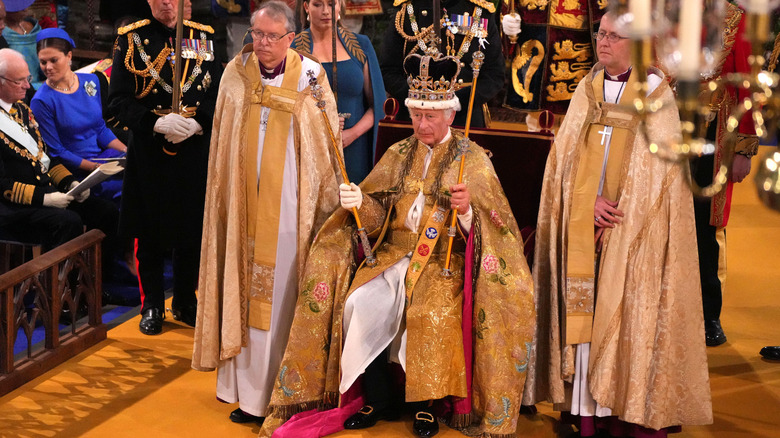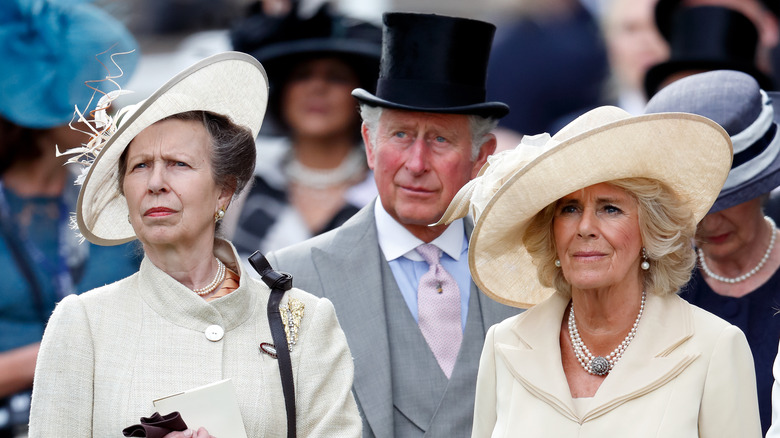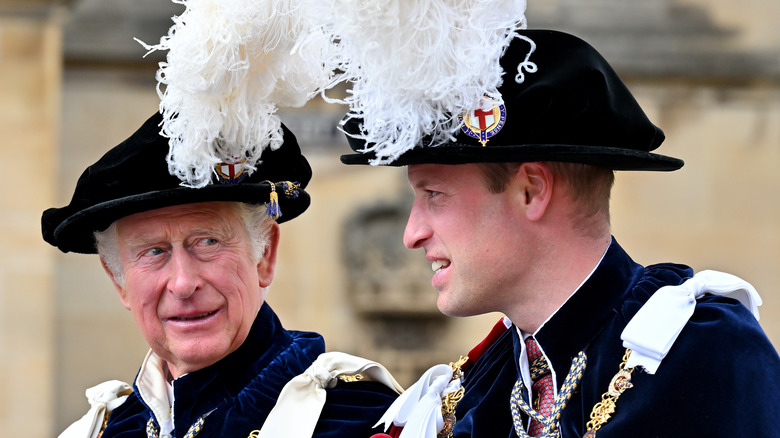What King Charles' Cancer Diagnosis Means For The Monarchy
The Royal Family's website explains the precise role of a British monarch: "The Sovereign acts as a focus for national identity, unity and pride; gives a sense of stability and continuity; officially recognizes success and excellence; and supports the ideal of voluntary service." Those seem like particularly challenging duties to fulfill when one is undergoing cancer treatment, but that is the current situation facing the House of Windsor.
King Charles III has been diagnosed with cancer, less than 18 months after he became king with the death of his mother, Queen Elizabeth II. The diagnosis has been announced shortly after he was hospitalized for a procedure to correct an enlarged prostate in January 2024. The palace hasn't confirmed the type of cancer, but they have stated that it isn't prostate cancer.
The diagnosis could cause some shake- ups in the royal family. For starters, the Buckingham Palace statement says, "[The king] has been advised by doctors to postpone public-facing duties," meaning there will be other royals picking up the slack when it comes to public appearances. Those appearances are pretty vital to the role of the monarchy, particularly when it comes to that idea of "stability and continuity."
Other royals will be seen at public events
It seems likely we'll be seeing more of Queen Camilla, Princess Anne, and William, Prince of Wales at public engagements in the coming days, and potentially even months. Though it's possible that it will be less of Prince William in the short-term considering the fact that Catherine, Princess of Wales is still recovering from the abdominal surgery she had in January 2024. William and Kate have three young children, and in the public statement from Kensington Palace that announced her surgery, it said she hoped "to maintain as much normality for her children as possible." Having William around would certainly help with that sense of normalcy.
All that being said, Prince William does already have some events scheduled for the first week of February — the first ones since his wife's surgery and now the first ones since his father's cancer diagnosis. On February 7, Prince William is scheduled to host an Investiture at Windsor Castle, bestowing awards or medals to recipients who have been recognized for their service, bravery, or achievements. He's also set to attend the annual fundraising gala for the London Air Ambulance that evening. It seems likely that he'll face questions about and words of support and condolence in regards to his father's condition, but we doubt he'll be saying anything. Both are formal affairs, and we'll expect to see all eyes on the prince as his duties as king-in-waiting intensify.
King Charles might have to deal with abdication speculation
William, Prince of Wales will likely be under increased scrutiny to see how he handles himself, as his father's condition could mean that the prince becomes the next monarch earlier than anticipated. That isn't to say that we have any information that hints that King Charles III will not fully recover after his cancer diagnosis, but there could be increased speculation and calls for King Charles to abdicate the throne.
Then there's the new precedent that King Charles seems to be setting by sharing details about his health, which could be problematic for some in the future who might prefer more privacy. See, for instance, the way that Catherine, Princess of Wales is keeping details of her surgery and health private. Granted, Kate isn't the monarch, but it could be that she would wish for her family the same privacy that she had, and someone in her family will almost certainly be the next king.
Being open about having cancer was not the standard that monarchs before King Charles followed. According to the book "Elizabeth: An Intimate Portrait," written by Gyles Brandreth, the queen had myeloma, a bone marrow cancer, before she died — yet her cause of death was listed as simply "old age." Her father, King George VI, had lung cancer, and even had an entire lung removed. He, and the public, were told it was due to "structural abnormalities" and not due to cancer. At any rate, many are certainly wishing the king a speedy recovery.


